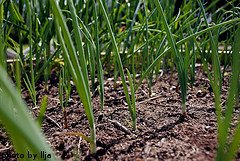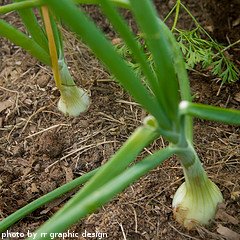Fertilizing and Watering Onions
When watering onions, it's important to keep the soil moist, but not wet. Onions tend to rot easily in soggy soil. When fertilizing onions, it's important to use a nitrate based fertilizer and not a sulfate based fertilizer. A fertilizer made with sulfate tends to make onions more pungent and less sweet. With good watering and fertilizing techniques, your onion crop will get the boost it needs to produce lots of juicy, sweet onions.
Watering Onions
It's a good idea to keep the soil in your onion patch consistently moist. Onions have shallow roots, so deep soaks are not necessary. You will be better off watering onions every couple of days if no rain falls in your area. A drip irrigation system will work great, but they can be expensive to install. A soaker hose will work just fine. You can also use an adjustable sprayer attached to the end of a hose. Set the sprayer on the mist setting and give your onion plants enough water to make the soil on top very damp. You can also use a watering can, just be sure to water slowly enough so that the soil around the bulbs does not wash away.
It's a good idea to water onions in the early morning or evening hours. Since you are not watering very deeply, you don't want the sun to evaporate the water from the surface of the soil before it has a chance to penetrate it.

You can apply a thin layer of mulch in your onion patch. This will help to keep the soil evenly moist. Grass clippings, straw or chopped up leaves work well as mulch. Just remember to pull back the mulch layer when the plants get large so they will have room to begin to push themselves out of the soil.
Fertilizing Onions
It's best to fertilize the soil in your onion patch before you plant the onion seedlings or sets. Choose a timed release, balanced granular fertilizer, like 10-10-10 or 12-12-12. Mix it into the soil before planting. An easy way to accomplish this is to scatter the granules on the ground and then till the soil one last time. Apply the granules at the rate suggested by the manufacturer - usually 1 1/2 pounds per 100 square feet. Again, try to use a nitrate based fertilizer instead of a sulfate based one. This will make your onions more sweet and mild. You also won't cry nearly as much when you chop them up.
If you want to grow onions organically, work a layer of compost or well rotted manure into the soil before planting. The layer should be a couple of inches thick.
Once you are done planting, you shouldn't have to fertilize your onion patch again until next year.
Now that you know about fertilizing and watering onions, it's time to think about harvesting them...

Click here to learn about harvesting onions
Click here for some of our favorite onion recipes
Click here to move from our Fertilizing and Watering Onions page to our Growing Onions main page
Click here to go to our Home page